
a.
To find:The statement “A square is a rhombus is A, S or N”.
a.
Answer to Problem 8PSA
The statement isA.
Explanation of Solution
Given information:
A square ABCD.
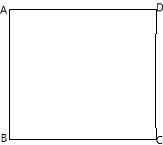
In square, all sides are equal and each angle is 90 degree.
In rhombus all sides are equal andhas two opposite sets of
The property of square is similar to that of rhombus.
b.
To find: The statement “A rhombus is a square is A, S or N”.
b.
Answer to Problem 8PSA
The statement is S.
Explanation of Solution
Given information:
A rhombusABCD.
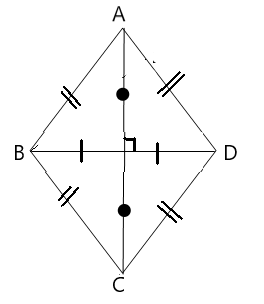
In rhombus all sides are equal and has two opposite sets of angles are equal.
In square, all sides are equal and each angle is 90 degree.
The property of rhombus is similar to that of square.
There exists a case where two opposites set of angles are not 90 degree. In this case, rhombus is not a square.
c.
To find: The statement “A kite is a parallelogram is A, S or N”.
c.
Answer to Problem 8PSA
The statement is S.
Explanation of Solution
Given information:
A kite KITE.
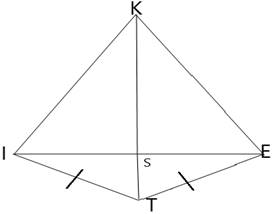
A kite is a quadrilateral that has 2 pairs of equal length sides and these sides are adjacent to each other.
A parallelogram is a simple quadrilateral with two pairs of parallel sides.
The property of kite is not similar to that of parallelogram.
There exists a case where kite will be parallelogram with two pairs of parallel sides.
d.
To find: The statement “A rectangle is a
d.
Answer to Problem 8PSA
The statement is A.
Explanation of Solution
Given information:
A rectangleABCD.
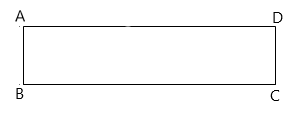
A rectangle is a quadrilateral with four right angles and equal parallel sides.
A polygon is a plane figure that is described by a finite number of straight line segments connected to form a polygonal circuit.
The property of rectangle is similar to that of polygon.
e.
To find: The statement “A polygon has same number of vertices as sides is A, S or N”.
e.
Answer to Problem 8PSA
The statement is A.
Explanation of Solution
Given information:
A polygon.
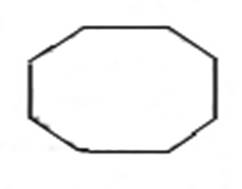
A polygon is a plane figure that is described by a finite number of straight line segments connected to form a polygonal circuit.
The vertex is a corner of the polygon. In any polygon, the number of sides and vertices are always equal. The sides are the straight line segments that make up the polygon.
f.
To find: The statement “A parallelogram has three diagonals” is A, S or N”.
f.
Answer to Problem 8PSA
The statement is N.
Explanation of Solution
Given information:
A parallelogram ABCD.

A parallelogram is a simple quadrilateral with two pairs of parallel sides.
A diagonal is a line segment joining two vertices of a polygon, when those vertices are not on same edge.
A parallelogramABCD has two diagonalsAC and BD.
g.
To find: The statement “A trapezoid has three bases” is A, S or N”.
g.
Answer to Problem 8PSA
The statement is N.
Explanation of Solution
Given information:
A trapezoidRSTV.
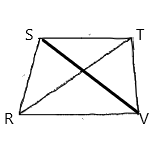
The below property is used:
In any isosceles trapezoid, two opposite sides (the bases) are parallel, and the other sides (the legs) are of equal length.
In trapezoid RSTV.ST and RV are only two bases.
Chapter 5 Solutions
Geometry For Enjoyment And Challenge
Additional Math Textbook Solutions
Elementary Statistics: Picturing the World (7th Edition)
Calculus: Early Transcendentals (2nd Edition)
Intro Stats, Books a la Carte Edition (5th Edition)
University Calculus: Early Transcendentals (4th Edition)
College Algebra (7th Edition)
A First Course in Probability (10th Edition)
 Elementary Geometry For College Students, 7eGeometryISBN:9781337614085Author:Alexander, Daniel C.; Koeberlein, Geralyn M.Publisher:Cengage,
Elementary Geometry For College Students, 7eGeometryISBN:9781337614085Author:Alexander, Daniel C.; Koeberlein, Geralyn M.Publisher:Cengage,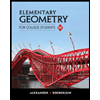 Elementary Geometry for College StudentsGeometryISBN:9781285195698Author:Daniel C. Alexander, Geralyn M. KoeberleinPublisher:Cengage Learning
Elementary Geometry for College StudentsGeometryISBN:9781285195698Author:Daniel C. Alexander, Geralyn M. KoeberleinPublisher:Cengage Learning

